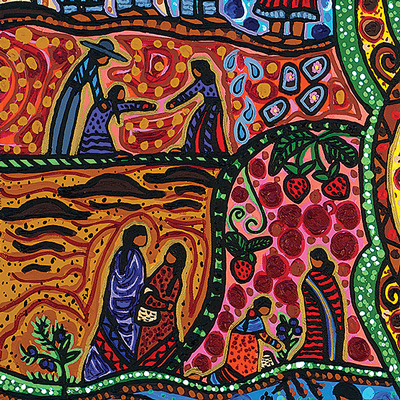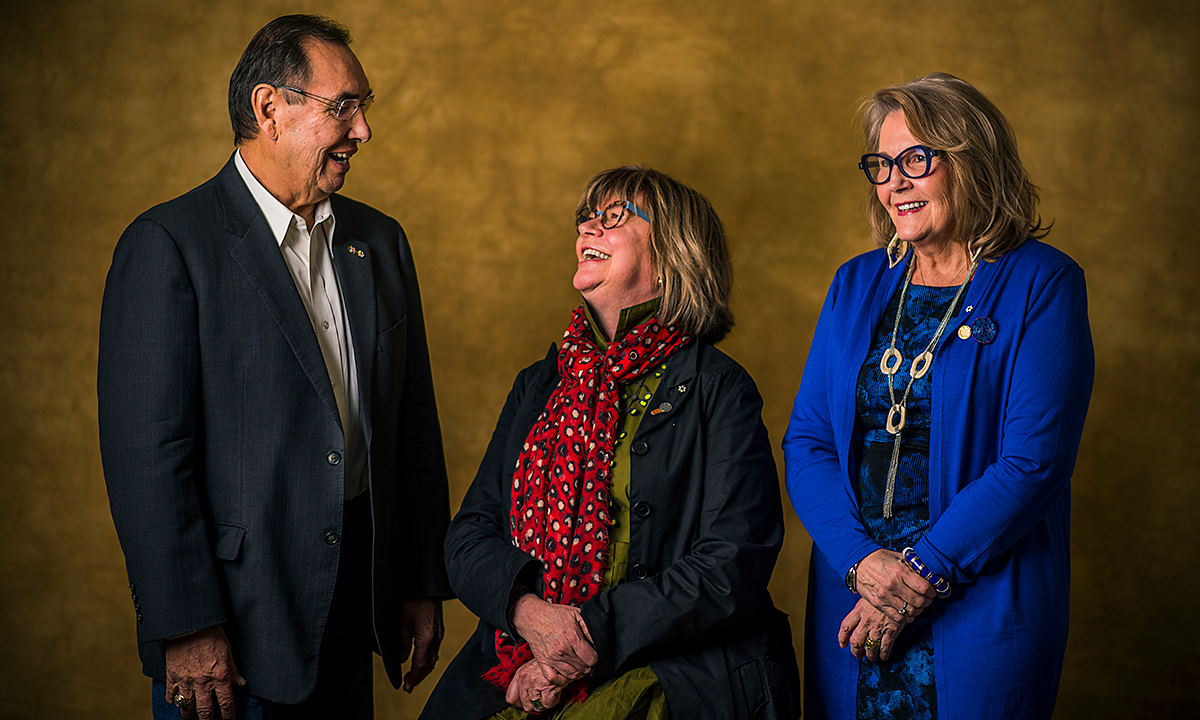Nearly two years after the Truth and Reconciliation Commission's final report, two of the TRC commissioners talk about what has happened since and how Canadians can move forward.
Treaty 6 Grand Chief Wilton Littlechild, '67 BPE, '75 MA, '76 LLB, '07 LLD (Honorary), is from the Cree community of Maskwacis and spent 14 years in residential schools. He is the first First Nations person elected to Parliament. Marie Wilson, who will receive an honorary degree from the University of Alberta in June, is a journalist, teacher and senior executive manager. Wilson and Littlechild, along with Murray Sinclair, were commissioners of the TRC. This excerpt is from A Conversation About Reconciliation, part of the Edmonton Public Library's Forward Thinking Speaker Series (epl.ca). The event was moderated by Shelagh Rogers, CBC journalist and honorary witness to the TRC.
Shelagh Rogers: Where are we right now, as we look at the scale of having the truth? Where are we on the road to reconciliation? What do you think? What do you see?
Wilton Littlechild: Many times, at least in the early stages, survivors told us - or asked me directly a couple of times - "What makes you think you're going to believe me? I've told my story seven times and no one believes me." We heard of children who tried to tell their parents about the abuse they were suffering in school and the parents didn't believe them. So, there is a right to be believed. And you, each and every one of you, also have another right: the right to know. You have the right to know the truth of what happened.
So, where are we? Well, we've had a tremendous, I believe, a tremendous beginning on this path of reconciliation. I've been to over 75 communities since we gave our final report and I'm very, very encouraged about what I see across the country. I see, for example, colleges and universities getting together for the first time as post-secondary institutions, to look at the calls to action on education, that cluster on education, and mapping out five years forward. I went to boardrooms, especially in the city of Calgary, where private industry wanted to know what can we do from the private sector.
So, in the schools, in the communities, in the boardrooms, in government chambers, council chambers, legislatures, I see and I feel this commitment, and it's so, so encouraging for me. Because the biggest fear I had as a commissioner, knowing the history of some of the previous commissions, was that our report would just sit on a shelf and gather dust.
But you know what? Thanks to Alberta, thanks to Canada. … When the federal government says, we're addressing 41 of the 45 calls to action directed at us as the government, I think that's great. When a prime minister directs the ministers - all of them - about reconciliation and actually sends a mandate letter to the minister of Indigenous Affairs, called on her to continue the work of truth and reconciliation, and the next sentence was, "And begin with the implementation of the UN declaration."
If we were gathered here two years ago and I said that, "You know what? Canada's going to implement the UN declaration," you would have said, "Uh-oh, that Willie … the residential school finally got him." [Laughter] You would have thought I was nuts. But here we are, here we are in Canada, embarking on this journey. So, I'm really encouraged, Shelagh, about where we are now because it's a tremendous start, I think. People say, of course, we have a long way to go, but still, we've got a tremendous start.
SR: Marie?
Marie Wilson: I come from a journalistic background before the commission work and so, you know, I am a trained skeptic. [laughter] That's my professional grooming and I would say that we have to keep our eyes on the game plan. Because a lot of talk is a lot of talk. Activity is not consequence. Activity is not result and activity is not change. So, I do believe fully that a lot of dialogue is necessary. But we are always starting from the beginning, so we have this dual role of constantly restating and starting from the beginning while trying to make [progress].
As citizens, we must play our role as government, to act as if we are the government, and make sure that we are giving the direction to the leadership that we elect and that we hold them to deliver on it. Because in the end, down the road, if nothing changes it won't matter what we said we promised to do. We've already had that experience with treaties, which were both legal and moral promises - and they have been broken so many times they can't be counted. We need to be vigilant and make sure that no one is let off the hook and let off their promises toward reconciliation. And that the talk is actually delivering some practical changes.
SR: There are a lot of people who would love to know what individuals can do - two or three simple actions that will push reconciliation forward. If they've never done anything before, what should they do?
MW: Well, I always start with this one. …. [Have you] read the 94 calls to action of the TRC? Start there. Read that. It's, I always say, not 94 pages, it's about 10 pages. Very readable.
And then I say, as you read it, be consciously asking yourself, Where do my initials belong? What is my profession? What is my personal life? What is my faith community? What are my personal affiliations? See where your name belongs. And then figure out from there whether it's something you, yourself, can do or others.
Because a lot of people in here are involved in book clubs - this is, after all, the Edmonton Public Library event - put it on your reading list. Read the calls to action and read the summary report of the Truth and Reconciliation Commission and engage in conversation. There are many residential students, experts in their field, who are available to come and engage with you in conversation. Why not do that? You will build relationships by doing that. And deepen your understanding of things.
WL: I think, for me, it is to reach out. Reach out to us or reach out to a neighbour and have a dialogue or a discussion. I sometimes reflect on an experience I had when I was in a previous life and coming back from the United Nations, where I worked for a long, long time, to report back to the elders. And I said, "Well, I came back from the UN again and this time dialogue almost broke out." [laughter] So I think reaching out to someone, and just having a dialogue, is a good first step in terms of what can an individual do. So, reach out to us, some of us or your neighbour, and talk about truth and reconciliation.
You know I found it very difficult, the mandate that was given [to the TRC] by the court. I found it difficult to ask the people [residential school survivors] to share their truth and immediately go to reconciliation. Yes, it's important to know the truth. It's equally important to have an apology. The prime minister of Canada gave an apology on behalf of Canadians. But it's also equally important - I think sometimes more important - that we be given an opportunity to forgive. To forgive what happened to us as children.
So, the truth and apology and forgiveness. Then healing can start. And when that starts, people will begin to feel a sense of justice. And then you can talk about reconciliation.
MW: That's part of the role of witnessing, actually, is passing forward what you, yourself, learned and sharing that with others. But, I would also … many of you here are parents in this room. Know what your children are being taught in school about all of this. We have an adult population in Canada that has been dramatically ignorant of all this history because we were not taught it in school, and you need to be the ones who need to make sure that … we are teaching, and we are not making the same errors by either negative stereotyping or glaring omissions.
This province is on the record as saying a curriculum is going to be developed. Be impatient about that and expect it to be done as an urgent priority. And then begin engaging with your children and grandchildren so you can have those conversations about things no one has ever talked about before in their homes. As we start to get more comfortable with knowing how to speak to and about each other, and that becomes normalized, then we start to redefine our sense of society and our sense of who our neighbours are - as opposed to our current reality, where most of us have grown up living in complete ignorance of each other.
This conversation has been edited for length and clarity.
-

New MOOC focuses on Indigenous Canada
Sign up for a free U of A massive open online course that explores Indigenous peoples' history and contemporary issues.

We at New Trail welcome your comments. Robust debate and criticism are encouraged, provided it is respectful. We reserve the right to reject comments, images or links that attack ethnicity, nationality, religion, gender or sexual orientation; that include offensive language, threats, spam; are fraudulent or defamatory; infringe on copyright or trademarks; and that just generally aren’t very nice. Discussion is monitored and violation of these guidelines will result in comments being disabled.